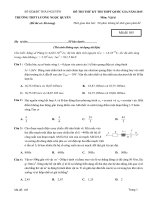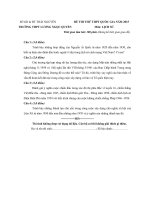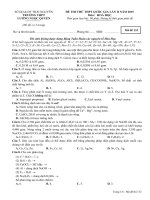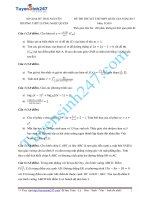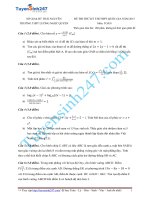Tải Đề thi thử THPT Quốc gia môn Tiếng Anh lần 2 năm 2015 trường THPT Lương Ngọc Quyến, Thái Nguyên - Đề thi thử đại học môn tiếng Anh có đáp án
Bạn đang xem bản rút gọn của tài liệu. Xem và tải ngay bản đầy đủ của tài liệu tại đây (143.8 KB, 10 trang )
<span class='text_page_counter'>(1)</span><div class='page_container' data-page=1>
<b>SỞ GD & ĐT THÁI NGUYÊN </b>
<b>TRƯỜNG THPT LƯƠNG NGỌC QUYẾN </b>
<b>ĐỀ THI THỬ KỲ THI THPT QUỐC GIA - NĂM HỌC:2014-2015</b>
Môn: Tiếng Anh
<i>Thời gian làm bài: 90 phút (Không kể thời gian giao đề)</i>
<b>MÃ ĐỀ:132 </b>
Họ tên học sinh:... SBD:...
<b>I. PHẦN TRẮC NGHIỆM:</b>
<i><b>Question1: Choose the word whose main stress is placed differently from the others.</b></i>
<b>A. irrigate</b>
<b>B. ancestry</b>
<b>C. delicate</b>
<b>D. cosmetic</b>
<i><b>Question2: Choose one best option to complete the sentence by circling the corresponding letter A,</b></i>
<i><b>B, C, D. </b></i>
- "Happy birthday! This is a small present for you." - “____________”
<b>A. What a pity!</b>
<b>B. Have a good time!</b>
<b>C. How beautiful it is! Thanks.</b>
<b>D. How terrible!</b>
<i><b>Question3: Choose one best option to complete the sentence by circling the corresponding letter A,</b></i>
<i><b>B, C, D. </b></i>
Air constricted between the vocal chords makes them _________ producing sounds
<b>A. to vibrate</b>
<b>B. vibrating</b>
<b>C. vibrate</b>
<b>D. the vibration</b>
<i><b>Question4: Choose one best option to complete the sentence by circling the corresponding letter A,</b></i>
<i><b>B, C, D. </b></i>
- “_________________” - " Oh, its' great!"
<b>A. What do you think of the music of the film? B. What do you like the music of the film ?</b>
<b>C. How is the music of the film like?</b>
<b>D. Would you like the music of the film?</b>
<i><b>Question5: Choose one best option to complete the sentence by circling the corresponding letter A,</b></i>
<i><b>B, C, D. </b></i>
The first customer ______ this morning was quite rude.
<b>A. dealing with</b>
<b>B. to deal with</b>
<b>C. dealt with</b>
<b>D. with whom we dealt</b>
<i><b>Question6: Mark the letter A, B, C, or D to show the underlined part that needs correction</b></i>
UNICEF was created in 1946 help bring food and medicine to children who suffered during
A B C D
World War II in Europe.
<i><b>Question7: Choose one best option to complete the sentence by circling the corresponding letter A,</b></i>
<i><b>B, C, D. </b></i>
By the end of next year my father ________in this company for 10 years.
</div>
<span class='text_page_counter'>(2)</span><div class='page_container' data-page=2>
<b>C. will have been working</b>
<b>D. has worked</b>
<i><b>Question8: Choose one best option to complete the sentence by circling the corresponding letter A,</b></i>
<i><b>B, C, D. </b></i>
At the end of the letter Mary wrote, "Give my best ________to your parents."
<b>A. hopes</b>
<b>B. wishes</b>
<b>C. words</b>
<b>D. belief</b>
<i><b>Question9: Choose one best option to complete the sentence by circling the corresponding letter A,</b></i>
<i><b>B, C, D. </b></i>
The boy _________ in the accident was taken to the hospital.
<b>A. injures</b>
<b>B. injuring</b>
<b>C. injure</b>
<b>D. injured</b>
<i><b>Question10: Choose one best option to complete the sentence by circling the corresponding letter</b></i>
<i><b>A, B, C, D. </b></i>
Schooling is compulsory for all Vietnamese children _________from six to fourteen.
<b>A. age</b>
<b>B. aged</b>
<b>C. at age</b>
<b>D. on age</b>
<i><b>Question11: Choose one best option to complete the sentence by circling the corresponding letter</b></i>
<i><b>A, B, C, D. </b></i>
They don’t allow ______________ here.
<b>A. to take photographs B. taking photographs</b>
<b>C. photographs to take D. photographs taking</b>
<i><b>Read the passage and choose the best answer (A or B, C, D) from 12 to 21</b></i>
When the word "endangered" is mentioned, people usually think of particular species, like the
panda or whooping crane. However, we would like to encourage you to think about
(12)
________ in
a broader context. It is
(13)
__________, the physical places where species live and interact with one
another. Although the development of special breeding programs, also known as captive
conservation, may help some species in some cases, it is clearly not
(14)
______ answer to the global
problem. Indeed,
(15)
______ we are able to protect natural areas where endangered species actually
live, they have no future. .
Species become endangered for a wide
(16)
_____ of reasons. By analyzing and grouping many
individual cases, however, we find the same broad causes
(17)
________ again and again. They are
Habitat Destruction, Exotic Species, and Overexploitation. Among other factors threatening particular
species are limited: distribution, disease, and pollution. Limited distributions are often a consequence
of other threats: populations confined to one or a few small areas because of habitat
(18)
_________,
for example, may be disastrously affected by random factors. Diseases can have severe
(19)
_____ on
species lacking natural genetic protections against particular pathogens, like the rabies and canine
distemper viruses that are currently devastating carnivore populations in East Africa. Domestic
animals are usually the reservoirs of these and other diseases affecting wild
(20)
_________, showing
once again that human activities lie at the root of most causes of endangerment. Pollution has
seriously done harm
(21)
_________ number of terrestrial species, although species living in
freshwater and marine ecosystems are also suffering.
<b>Question12: </b>
<b>A. pollution</b>
<b>B. endangerment</b>
<b>C. contamination</b>
<b>D. development</b>
</div>
<span class='text_page_counter'>(3)</span><div class='page_container' data-page=3>
<b>Question14: </b>
<b>A. Ø</b>
<b>B. the</b>
<b>C. a</b>
<b>D. an</b>
<b>Question15: </b>
<b>A. unless</b>
<b>B. but</b>
<b>C. if</b>
<b>D. so</b>
<b>Question16: </b>
<b>A. commerce</b>
<b>B. destruction</b>
<b>C. extinction</b>
<b>D. variety</b>
<b>Question17: </b>
<b>A. showing</b>
<b>B. disappearing</b>
<b>C. appearing</b>
<b>D. expressing</b>
<b>Question18: </b>
<b>A. gone</b>
<b>B. reserve</b>
<b>C. loss</b>
<b>D. benefit</b>
<b>Question19: </b>
<b>A. interest</b>
<b>B. absorption</b>
<b>C. infection</b>
<b>D. impact</b>
<b>Question20: </b>
<b>A. populations</b>
<b>B. needs</b>
<b>C. medicines</b>
<b>D. natures</b>
<b>Question21: </b>
<b>A. with</b>
<b>B. at</b>
<b>C. to</b>
<b>D. for</b>
<i><b>Question22: Chose one best option to complete the sentence by circling the corresponding letter A,</b></i>
<i><b>B, C, D. </b></i>
It took me weeks to ________ my illness.
<b>A. recover from</b>
<b>B. neglected</b>
<b>C. soothe</b>
<b>D. lessen</b>
<i><b>Question23: Choose one best option to complete the sentence by circling the corresponding letter</b></i>
<i><b>A, B, C, D. </b></i>
This new kind of medicine is quickly ______ into the body.
<b>A. absorbed</b>
<b>B. gone</b>
<b>C. poured</b>
<b>D. accessed</b>
<i><b>Question24: Choose one best option to complete the sentence by circling the corresponding letter</b></i>
<i><b>A, B, C, D. </b></i>
He wasn't _________________the job.
<b>A. experienced enough to do</b>
<b>B. experienced to do enough</b>
<b>C. experienced enough doing</b>
<b>D. enough experienced to do</b>
<i><b>Question25: Choose one best option to complete the sentence by circling the corresponding letter</b></i>
<i><b>A, B, C, D. </b></i>
Books are still a cheap way to get information and ________.
<b>A. entertain</b>
<b>B. entertainment</b>
<b>C. entertaining</b>
<b>D. entertainer</b>
<i><b>Question26: Choose one best option to complete the sentence by circling the corresponding letter</b></i>
<i><b>A, B, C, D. </b></i>
My mother said _________ my study results the year before.
<b>A. she was satisfied to</b>
<b>B. she was satisfied with</b>
<b>C. she is satisfied with</b>
<b>D. she is satisfied to</b>
<i><b>Question27: Choose one best option to complete the sentence by circling the corresponding letter</b></i>
<i><b>A, B, C, D. </b></i>
Her illness was _____ we thought at first.
<b>A. much serious than</b>
<b>B. much more serious than</b>
<b>C. seriouser than</b>
<b>D. much seriously than</b>
</div>
<span class='text_page_counter'>(4)</span><div class='page_container' data-page=4>
A B C
sunlight than the others one.
D
<i><b>Question29: Choose one best option to complete the sentence by circling the corresponding letter</b></i>
<i><b>A, B, C, D. </b></i>
_______ Betty, I ' m not surprised she won the prize.
<b>A. To have known</b>
<b>B. To know</b>
<b>C. To be known</b>
<b>D. Knowing</b>
<i><b>Question30: Choose one best option to complete the sentence by circling the corresponding letter</b></i>
<i><b>A, B, C, D. </b></i>
I was appalled_______ the lack of staff in the hospital.
<b>A. at</b>
<b>B. in</b>
<b>C. on</b>
<b>D. with</b>
<i><b>Question31: Choose one best option to complete the sentence by circling the corresponding letter</b></i>
<i><b>A, B, C, D. </b></i>
________ ten minutes earlier, you would have got a better seat.
<b>A. Were you arrived</b>
<b>B. If you hadn’t arrive C. If you arrive</b>
<b>D. Had you arrived</b>
<i><b>Question32: Choose one best option to complete the sentence by circling the corresponding letter</b></i>
<i><b>A, B, C, D. </b></i>
-"Do you mind if I use your bike?" - “_______________ .”
<b>A. Yes, you do.</b>
<b>B. Yes. It's my pleasure</b>
<b>C. No, you don't</b>
<b>D. No. You can use it</b>
<i><b>Question33: Choose the word whose underlined part is pronounced differently.</b></i>
<b>A. traveled</b>
<b>B. seemed</b>
<b>C. jumped</b>
<b>D. starred.</b>
<i><b>Read the passage and choose the best answer (A or B, C, D) from 34 to 43</b></i>
<b>Before the mid-nineteenth century, people in the United States ate most foods only in season.</b>
Drying, smoking, and salting could preserve meat for a short time, but the availability of fresh meat,
<b>like that of fresh milk, was very limited; there was no way to prevent spoilage. Bui in 1810 a French</b>
inventor named Nicolas Appert developed the cooking-and-sealing process of canning. And in 1850's
an American named Gail Borden developed a means of condensing and preserving milk. Canned
goods and condensed milk became more common during the 1860's, but supplies remained low
because cans had to be made by hand. By 1880, however, inventors had fashioned stamping and
soldering machines that mass-produced cans from tinplate. Suddenly all kinds of food could be
preserved and bought at all times of the year.
</div>
<span class='text_page_counter'>(5)</span><div class='page_container' data-page=5>
perishables. An easy means of producing ice commercially had been invented in the 1870's, and by
1900 the nation had more than two thousand commercial ice plants, most of which made home
<b>deliveries. The icebox became a fixture in most homes and remained so until the mechanized</b>
refrigerator replaced it in the 1920's and 1930's.
Almost everyone now had a more diversified diet,. Some people continued to eat mainly foods that
were heavy in starches or carbohydrates, and not everyone could afford meat. Nevertheless, many
families could take advantage of previously unavailable fruits, vegetables, and dairy products to
achieve more varied fare.
<b>Question34: What does the passage mainly discuss?</b>
<b>A. Causes of food spoilage</b>
<b>B. Commercial production of ice</b>
<b>C. Inventions that led to changes in the American diet</b>
<b>D. Population movements in the nineteenth century</b>
<b>Question35: The phrase "in season" in the passage refers to ___________</b>
<b>A. a kind of weather</b>
<b>B. an official schedule</b>
<b>C. a particular time of year</b>
<b>D. a method of flavoring food</b>
<b>Question36: The word "prevent" in the passage is closest in meaning to__________</b>
<b>A. estimate</b>
<b>B. avoid</b>
<b>C. correct</b>
<b>D. confine</b>
<b>Question37: During the 1860's, canned food products were _________</b>
<b>A. unavailable in meal areas</b>
<b>B. shipped in refrigerator cars</b>
<b>C. available in limited quantities</b>
<b>D. a staple part of the American diet</b>
<b>Question38: It can be inferred that railroad refrigerator cars came into use _________</b>
<b>A. before 1860</b>
<b>B. before 1890</b>
<b>C. after 1900</b>
<b>D. after 1920</b>
<b>Question39: The word "them" in the passage refers to _________</b>
<b>A. refrigerator cars</b>
<b>B. perishables</b>
<b>C. growers</b>
<b>D. distances</b>
<b>Question40: The word "fixture" in the passage is closest in meaning to ________</b>
<b>A. luxury item</b>
<b>B. substance</b>
<b>C. commonplace object</b>
<b>D. mechanical device</b>
<b>Question41: The author implies that in the 1920’s and 1930’s home, deliveries of ice_______</b>
<b>A. decreased in number</b>
<b>B. were on an irregular schedule</b>
<b>C. increased in cost</b>
<b>D. occurred only in the summer</b>
<b>Question42: Which of the following types of food preservation was NOT mentioned in the passage?</b>
<b>A. Drying</b>
<b>B. Canning</b>
<b>C. Cold storage</b>
<b>D. Chemical additives</b>
<b>Question43: Which of the following statements is supported by the passage?</b>
<b>A. Tin cans and iceboxes helped to make many foods more widely available.</b>
<b>B. Commercial ice factories were developed by railroad owners.</b>
<b>C. Most farmers in the United States raised only fruits and vegetables.</b>
<b>D. People who lived in cities demanded home delivery of foods.</b>
<i><b>Question44: Choose the word whose underlined part is pronounced differently.</b></i>
</div>
<span class='text_page_counter'>(6)</span><div class='page_container' data-page=6>
<i><b>Question45: Choose one best option to complete the sentence by circling the corresponding letter</b></i>
<i><b>A, B, C, D. </b></i>
You won’t achieve anything _____ you take risks.
<b>A. unless</b>
<b>B. that</b>
<b>C. if</b>
<b>D. when</b>
<i><b>Question46: Choose one best option to complete the sentence by circling the corresponding letter</b></i>
<i><b>A, B, C, D. </b></i>
- “________” -"It's nice"
<b>A. What does the weather like?</b>
<b>B. How does the weather like?</b>
<b>C. What do you think of the weather today?</b>
<b>D. Do you like the weather today?</b>
<i><b>Question47: Choose the word whose main stress is placed differently from the others.</b></i>
<b>A. discard</b>
<b>B. eardrum</b>
<b>C. exhaust</b>
<b>D. inject</b>
<i><b>Question48: Mark the letter A, B, C, or D to show the underlined part that needs correction</b></i>
<i><b>The change from summer to winter occurs very abrupt in the tundra regions of North America</b></i>
A B C D
<i><b>Question49: Choose one best option to complete the sentence by circling the corresponding letter</b></i>
<i><b>A, B, C, D. </b></i>
The thieves ran away when the burglar alarm ____________
<b>A. went off</b>
<b>B. went out</b>
<b>C. went on</b>
<b>D. went by</b>
<i><b>Question50: Choose the word whose main stress is placed differently from the others.</b></i>
<b>A. catalogue</b>
<b>B. register</b>
<b>C. devotee</b>
<b>D. maximum</b>
<i><b>Question51: Mark the letter A, B, C, or D to show the underlined part that needs correction</b></i>
Maria is used to eat a large breakfast because she likes to take her time in the morning
A B C D
<i><b>Question52: Choose one best option to complete the sentence by circling the corresponding letter</b></i>
<i><b>A, B, C, D. </b></i>
Most underdeveloped countries are in ________ of technical assistance.
<b>A. shortage</b>
<b>B. need</b>
<b>C. lack</b>
<b>D. excess</b>
<i><b>Read the passage and choose the best answer (A or B, C, D) from 53 to 62</b></i>
<i><b>We find that bright children are rarely held back by mixed-ability teaching. On the contrary, both</b></i>
their knowledge and experience are enriched. We feel that there are many disadvantages in streaming
pupils. It does not take into account the fact that children develop at different rates. It can have a bad
effect on both the bright and the not-so-bright child. After all, it can be quite discouraging to be at the
bottom of the top grade!
</div>
<span class='text_page_counter'>(7)</span><div class='page_container' data-page=7>
In our classrooms, we work in various ways. The pupils often work in groups: this gives them the
opportunity to learn to co-operate, to share, and to develop leadership skills. They also learn how to
cope with personal problems as well as learning how to think, to make decisions, to analyze and
evaluate, and to communicate effectively. The pupils learn from each other as well as from the
teachers.
Sometimes the pupils work in pairs; sometimes they work on individual tasks and assignments,
and they can do this at their own speed. They also have some formal class teaching when this is
appropriate. We encourage our pupils to use the library, and we teach them the skills they need in
order to do this effectively. An advanced pupil can do advanced work; it does not matter what age the
child is. We expect our pupils to do their best, not their least, and we give them every encouragement
to attain this goal.
<b>Question53: </b>
In the passage, the author’s attitude towards “mixed-ability teaching” is ______.
<b>A. critical</b>
<b>B. questioning</b>
<b>C. approving</b>
<b>D. objective</b>
<b>Question54: </b>
<i>The words “held back” in 1</i>
st<sub> paragraph means “_______________”.</sub>
<b>A. forced to study in lower classes</b>
<b>B. prevented from advancing</b>
<b>C. made to remain in the same classes</b>
<b>D. made to lag behind in study</b>
<b>Question55: The author argues that a teacher’s chief concern should be the development of the</b>
pupils’ ___________.
<b>A. learning ability and communicative skills</b>
<b>B. intellectual abilities</b>
<b>C. personal and social skills</b>
<b>D. total personality</b>
<b>Question56: </b>
Which of the following is NOT mentioned in the passage?
<b>A. Pupils also learn to develop their reasoning ability.</b>
<b>B. Group work gives pupils the opportunity to learn to work together with others.</b>
<b>C. Group work provides the pupils with the opportunity to learn to be capable organizers.</b>
<b>D. Pupils also learn how to participate in teaching activities.</b>
<b>Question57: The author’s purpose of writing this passage is to ______.</b>
<b>A. recommend pair work and group work classroom activities</b>
<b>B. emphasize the importance of appropriate formal classroom teaching</b>
<b>C. offer advice on the proper use of the school library</b>
<b>D. argue for teaching bright and not-so-bright pupils in the same class</b>
<b>Question58: </b>
According to the passage, which of the following is NOT TRUE?
<b>A. It’s not good for a bright child to find out that he performs worst in a mixed-ability class.</b>
<b>B. Development of pupils as individuals is not the aim of group work.</b>
<b>C. Pupils cannot develop in the best way if they are streamed into classes of different intellectual </b>
abilities.
<b>D. There is no fixed method in teaching pupils to develop themselves to the full.</b>
<b>Question59: </b>
According to the passage, which of the following is an advantage of mixed-ability
teaching?
<b>A. Formal class teaching is the important way to give the pupils essential skills such as those to be </b>
used in the library.
</div>
<span class='text_page_counter'>(8)</span><div class='page_container' data-page=8>
<b>C. Pupils as individuals always have the opportunities to work on their own.</b>
<b>D. A pupil can be at the bottom of a class.</b>
<b>Question60: </b>
Which of the following statements can best summaries the main idea of the passage?
<b>A. Children, in general, develop at different rates.</b>
<b>B. Bright children do benefit from mixed-class teaching.</b>
<b>C. The aim of education is to find out how to teach the bright and not-so-bright pupils.</b>
<b>D. Various ways of teaching should be encouraged in class.</b>
<b>Question61: </b>
According to the passage, “streaming pupils” _____.
<b>A. is the act of putting pupils into classes according to their academic abilities</b>
<b>B. aims at enriching both their knowledge and experience</b>
<b>C. is quite discouraging</b>
<b>D. will help the pupils learn best</b>
<b>Question62: According to the author, mixed-ability teaching is more preferable because ______.</b>
<b>A. formal class teaching is appropriate</b>
<b>B. it aims at developing the children’s total personality</b>
<b>C. children can learn to work with each other to solve personal problems</b>
<b>D. it doesn’t have disadvantages as in streaming pupils</b>
<i><b>Question63: Mark the letter A, B, C, or D to show the underlined part that needs correction</b></i>
Renewable energy sources such as the wind and sun energy is limitless.
A B C D
<i><b>Question64: Choose one best option to complete the sentence by circling the corresponding letter</b></i>
<i><b>A, B, C, D. </b></i>
I kept them in the ___________
<b>A. small metal black box.</b>
<b>B. black metal small box</b>
<b>C. metal black small box</b>
<b>D. small black metal box</b>
<b>II. PHẦN VIẾT: (Thí sinh làm bài trên giấy được phát)</b>
<b>A. Phần I: (Question 65-69)</b>
<i><b>Question65: Finish each of the following sentences in such a way that it means the same as the</b></i>
<i><b>sentence printed before it.</b></i>
He didn’t go to school because he was ill.
Because of………
<i><b>Question66: Finish each of the following sentences in such a way that it means the same as the</b></i>
<i><b>sentence printed before it.</b></i>
I regret telling him what we were planning to do.
I wish ………
<i><b>Question67: Finish each of the following sentences in such a way that it means the same as the</b></i>
<i><b>sentence printed before it.</b></i>
</div>
<span class='text_page_counter'>(9)</span><div class='page_container' data-page=9>
Nobody………
<i><b>Question68: Finish each of the following sentences in such a way that it means the same as the</b></i>
<i><b>sentence printed before it.</b></i>
That question cannot be answered satisfactorily.
There is no………
<i><b>Question69: Finish each of the following sentences in such a way that it means the same as the</b></i>
<i><b>sentence printed before it.</b></i>
You should eat a lot of fresh fruit.
He advised me………
<b>B. Phần II:</b>
<b> (Question 70-80)</b>
<b> In about 140 words, write a paragraph about the ways you should to to protect the environment.</b>
--- THE END
<i><b>---Trường THPT Lương Ngọc Quyến</b></i>
<b>ĐÁP ÁN ĐỀ THI THỬ KỲ THI THPT QUỐC GIA</b>
<b>Năm học: 2014-2015</b>
Môn: Tiếng Anh
<b>Mã đề: 132</b>
I. Phần trắc nghiệm (8 điểm)
<b>1</b>
D
<b>11</b>
B
<b>21</b>
C
<b>31</b>
D
<b>41</b>
A
<b>51</b>
A
<b>61</b>
A
<b>2</b>
C
<b>12</b>
B
<b>22</b>
A
<b>32</b>
D
<b>42</b>
D
<b>52</b>
B
<b>62</b>
B
<b>3</b>
C
<b>13</b>
C
<b>23</b>
A
<b>33</b>
C
<b>43</b>
A
<b>53</b>
C
<b>63</b>
D
<b>4</b>
A
<b>14</b>
D
<b>24</b>
A
<b>34</b>
C
<b>44</b>
D
<b>54</b>
B
<b>64</b>
D
<b>5</b>
D
<b>15</b>
A
<b>25</b>
B
<b>35</b>
C
<b>45</b>
A
<b>55</b>
D
<b>6</b>
B
<b>16</b>
D
<b>26</b>
B
<b>36</b>
B
<b>46</b>
C
<b>56</b>
D
<b>7</b>
C
<b>17</b>
C
<b>27</b>
B
<b>37</b>
C
<b>47</b>
B
<b>57</b>
D
</div>
<span class='text_page_counter'>(10)</span><div class='page_container' data-page=10>
<b>9</b>
D
<b>19</b>
D
<b>29</b>
D
<b>39</b>
B
<b>49</b>
A
<b>59</b>
C
<b>10</b>
B
<b>20</b>
A
<b>30</b>
A
<b>40</b>
C
<b>50</b>
C
<b>60</b>
B
<b>II. Phần viết (2điểm)</b>
<b>A. Viết lại câu</b>
<b>65. Because of her illness/sickness, he didn’t go to school.</b>
<b>66. I wish I had told him what we were planning to do.</b>
<b>67. Nobody (who is) lazy will be wealthy.</b>
<b>68. There is no satisfaction to answer/in answering that question.</b>
<b>69. He advised me to eat a lot of fresh fruit.</b>
<b>B. Viết luận</b>
-
Suitable vocabulary.
</div>
<!--links-->

